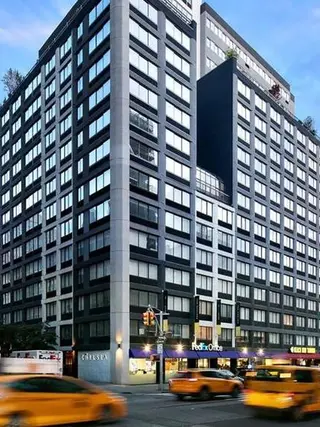 Carter Horsley
Carter HorsleyDec 23, 2011
Carter's Review
This attractive building at 160 West 24th Street is known as The Chelsea and was developed by the Lazar Group as a 7-story rental apartment building in 1987 but enlarged by the same developer to 18 stories in 1998.
It originally had 90 apartments, but when it was enlarged the total climbed to 204.
Bottom Line
Located in the heart of Chelsea, this building is diagonally across Seventh Avenue from a Whole Foods store and has excellent public transportation and good amenities.
Description
According to an New York Times article by Rachelle Garbarine in August 14, 1998, the enlargement left little evidence of its growing pains as both the addition and the existing structure were faced with a beige stucco accented with a dark brown trim to achieve “a reasonable blending of the old with the new,” according to Herbert L. Mandel, the architect for the conversion.
Amenities
The building has a 24-hour concierge, a 24-hour ground floor fitness center, a garage, coinless laundry facilities, a live-in superintendent, an 8th-floor sunroom and media room, two roof decks with kitchens, valet dry cleaning, pet services, and plant watering and other services for residents when they are out of town.
Apartments
All apartments are non-smoking and have ceilings that 9- to 10-feet tall and 32-inch flat-screen televisions in the living rooms.
Kitchens have GE stainless steel appliances, granite countertops, expresso cabinetry and bathrooms have Jacuzzi bathtubs.
Apartment H on the 8th through the 14th floors is a one-bedroom unit with an entry foyer with a 17-foot-long living/dining area next to an enclosed pass-through kitchen.
Apartment 8E is a one-bedroom unit that has an entry foyer that leads to an enclosed, pass-through kitchen that opens onto a 19-foot-long living/dining area with a large angled terrace.
Apartment 8J is a two-bedroom unit with a large entry foyer across from an enclosed kitchen that leads to a 16-foot-long living/dining area.
Apartment 8D is a two-bedroom unit with a long entry foyer that leads to an enclosed, pass-through kitchen off the 19-foot-long living dining area.
Some apartments are furnished by Oakwood Worldwide that bought the ExecuStay corporate housing brand from Marriott International Inc., in 2012.
History
The Times article noted that “adding so many floors to an occupied structure is rare,” adding that Ethan H. Lazar, a principal of the development group, said he pressed ahead because ''we always intended to build a larger building and invested an additional $1 million in the original foundation alone to support additional floors.''
The idea of constructing a building of this scale dates to 1985.
In 1985, the site’s zoning allowed a 16-story building with 140 units but the article said that “the developers decided to pursue a zoning change proposed along Seventh Avenue by the City Planning Department that would allow a larger building as part of the city's goal to reduce the number of tall, narrow towers in Manhattan.”
Because a tax-abatement program was about to expire, the developed rushed to put the building’s foundation in before 1986 even though the rezoning was not in place and was not approved until 1994.
It took the developer until early 1997 to design the addition to meet the new zoning and to secure the necessary building permits and financing to construct it. According to the article, the Building Investment Trust for the A.F.L-C.I.O. provided a $24 million financing package that included refinancing the entire building. The expansion brings additional amenities to the building, including a two-story glass atrium clubhouse, a landscaped roof garden and sun deck.
The developer also had to content with negotiations with tenants in the building.
Work on the project began in February 1997 but was stopped that June for three months after negotiations broke down between the landlord and tenants over concessions to residents for the inconvenience that the construction would cause.
“The concessions included free rent for all residents as well as hotel accommodations for tenants on the top two floors, who were to be relocated during the initial construction period. Unable to come to an agreement on the compensation, half the tenants in the building staged a rent strike. The dispute ultimately wound up in Housing Court and ended last August in a settlement, under which the landlord granted one month of free rent to all the existing tenants. In that same time, the safety plan required by the city's Buildings Department was revised to incorporate additional safety measures since tenants on the top two floors were staying in their apartments during the building process. Once that plan was in place, construction of the 11 additional floors, by HRH Construction of Manhattan, moved forward,” the article said.
An article by Nadine Brozan in the July 22, 2001 edition of The New York Times said that ExecuStay “has also signed a 15-year lease” on The Chelsea “that was recently bought by Townhouse Management and Pine Equity for $72 million. ExecuStay already has 29 units there in its portfolio and will add the remainder as leases expire.”

- Rental built in 1987
- Located in Chelsea
- 204 total apartments 204 total apartments
- Doorman
 6sqft delivers the latest on real estate, architecture, and design, straight from New York City.
6sqft delivers the latest on real estate, architecture, and design, straight from New York City.
